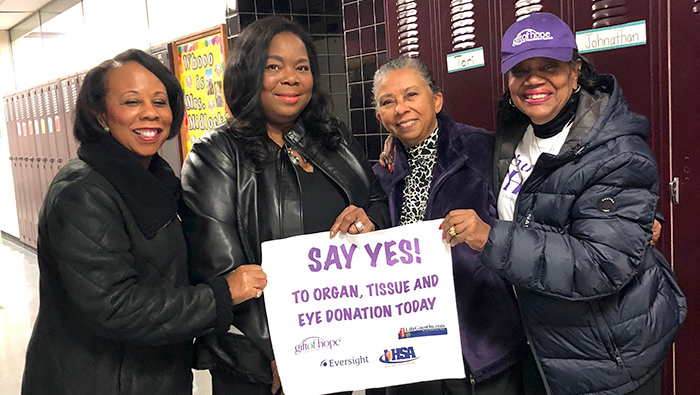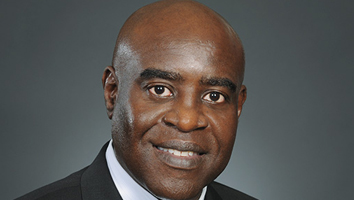
Improvement
“One Hero” invites Black Richmonders to serve their community
OPO partners with Black history museum to increase organ donor registrations
We want to change the narrative around this.”
Kia Potts is the Multicultural Community Affairs Director for LifeNet Health, a Virginia-based organ procurement organization (OPO). LifeNet Health is one of the 56 non-profits across the country who are on the front line of organ recovery. They work directly with the families of lost loved ones and help facilitate the gift of life. The narrative she’s working to change involves the lingering misconceptions about organ donation.
It’s why LifeNet Health established the “One Hero” campaign, which is an effort to increase the number of Black Richmond residents who have registered their decision to become organ donors. The legacy of health disparities and the realities of systemic racism, particularly within healthcare settings, makes this both complex and essential.
“It’s so important for professionals and the general public to think about these issues beyond February because it is a daily issue,” Potts says, adding, “It’s going to take a daily effort.”
A data-driven solution to help families leave legacies
The “One Hero” campaign was initially conceived in response to donor data the LifeNet team was collecting and reviewing. In certain zip codes in predominantly Black communities in the Richmond area, families were declining the opportunity to donate after a loved one had passed. The LifeNet team also noticed large percentages of individuals had not registered as organ donors.
After discussing a variety of issues that may have influenced the data, including lack of access and misinformation about donation, they considered an idea that could resonate in a way that empowered residents: “Who doesn’t want to save a life, or save the day or leave a legacy in that way?”
And so the “One Hero” campaign was born, focused on forming partnerships the community, offering information in an inclusive, empathetic way, and above all, meeting people where they were and giving them the opportunity to be of service to their neighbors as organ donors.

Kia Potts, Multicultural Community Affairs Director, LifeNet Health
Pictured above: Black History Museum & Cultural Center of Virginia
“… We wanted to really emphasize that you can be a hero in your community, and here’s how.”
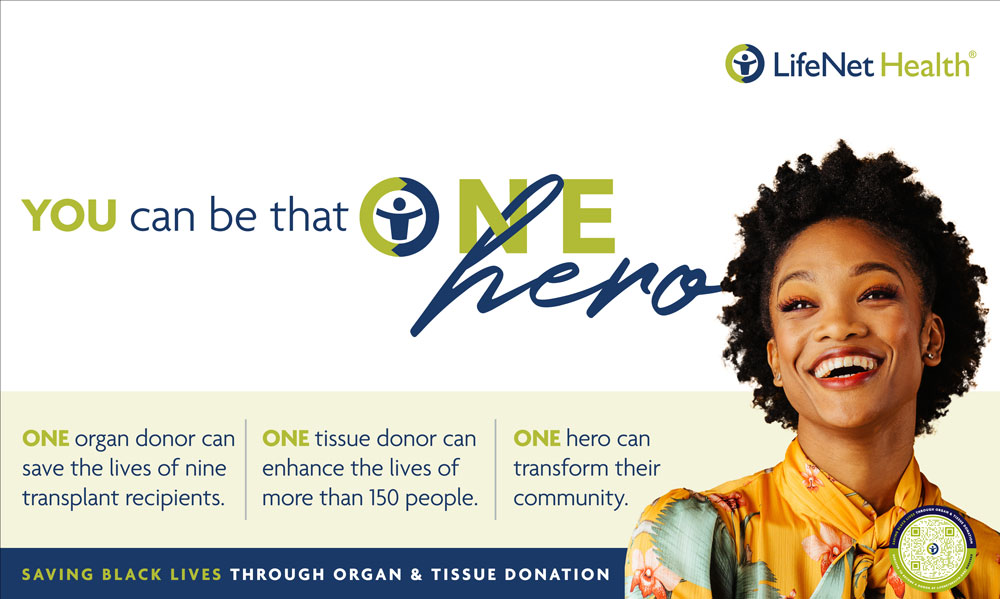
“When we think of a hero, we think of a celebrity or a Marvel character or a Disney character, and we wanted to really emphasize that you can be a hero in your community, and here’s how,” Potts says.
The results speak for themselves. Since the launch of the campaign, LifeNet Health has seen nearly a 19 percent registration increase in the communities that the “One Hero” campaign serves.
Adapting to the pandemic
“The initial idea for LifeNet Health’s “One Hero” campaign was to engage the community by participating in various neighborhood based events and promote discussions about organ donation, helping to dispel myths and serving as a trusted community resource. Then the pandemic hit.
19%
registration increase in the communities that the “One Hero” campaign serves
Potts says that LifeNet Health immediately jumped into action, shifting from a “boots on the ground” approach to a virtual model. In place of in-person events, they quickly launched the “One Hero” podcast, which featured interviews with prominent Black leaders, healthcare providers, transplant recipients and donor families, all focused on dispelling myths about organ donation and openly discussing health inequities.
Not only did the podcast serve as a valuable bridge for the project during the worst of the pandemic, but it also helped to foster community and set the stage for future in-person efforts.
“Virtual was a great supplement so once we were able, we could go into the community to really build that foundation,” Potts says. “See the people, talk to the people, see their faces, and connect with the people. Going into the communities and not waiting for them to come to us.”
On the ground again and making history
The pandemic was only a temporary slowdown. Potts recalls that once in-person events returned, LifeNet Health took “One Hero” on the road, showing up at festivals and local events, seeking out community sponsorship opportunities and remaining a constant presence in the Richmond community.
But not everything they did was focused solely on educating people about organ donation and transplant.
“We were showing up and building trust,” says Potts. “We weren’t just asking for registrations.”
And show up they did. LifeNet Health staff arrived at back-to-school nights to hand out backpacks. They gave out reusable grocery bags outside of local markets. They joined the community in welcoming students back to class during the first day of school. They even took part in a Thanksgiving Drive in the city’s Hillside neighborhood, serving as an event sponsor and passing out turkeys.
But in May of 2022, another opportunity arrived.
The Black History Museum and Cultural Center of Virginia was interested in partnering with LifeNet Health. The OPO had showed interest early on in collaborating with the museum, but at the time logistical factors precluded a partnership.
In May, however, the Black History Museum, which calls the Jackson Ward neighborhood home, were able to work with Potts and LifeNet Health on an exhibition specifically focused on the “One Hero” campaign, the importance of organ donation and increasing organ donor registrations among Richmond’s Black residents.
There was only one catch: they had three weeks to pull it off.
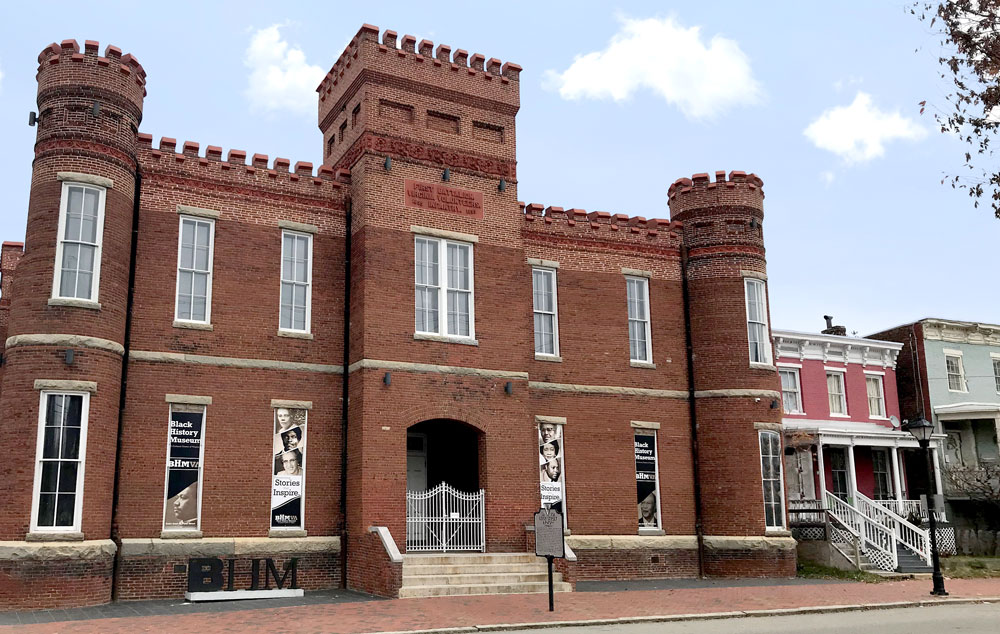
Black History Museum & Cultural Center of Virginia
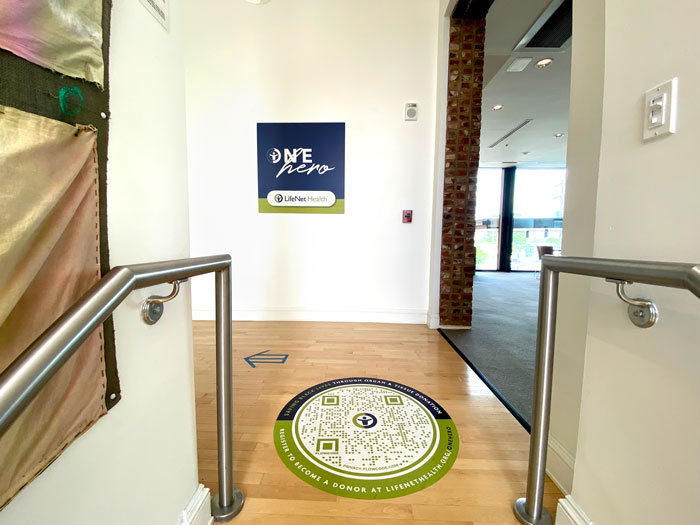
Inside the museum, signage directs visitors to exhibit
“I had never done anything like this before,” Potts remembered. “To my knowledge, LifeNet has never partnered with a museum before to do this type of exhibit.
With the help of a local Black-owned marketing firm, the museum staff and the “One Hero” Team led by Potts, the exhibit opened on May 12, 2022. It adapted the existing “One Hero” campaign into an educational multimedia installation, featuring video testimonials and PSAs, QR codes, infographics about donation and a clear call to action to sign up to be a donor.
Potts and her team were recognized nationally by Donate Life America (DLA), and she presented at that year’s DLA conference about the “One Hero” campaign, the exhibit at the Black History Museum in Richmond and how other OPOs could work with local cultural institutions.
The work continues
“So many people in the Black community have ties to donation,” Potts says. “Whether it’s someone waiting for a kidney, going through dialysis, there’s a tie. And we were able to make that connection. We just showed up.”
What’s next? Taking the successful pilot beyond Richmond and expanding to LifeNet Health’s entire donation service area across Virginia.
It’s clear that there’s an appetite for this level of engagement. Even after the exhibition closed at the museum, Potts and her team continue to take part in community events, conduct outreach and serve as trusted partner.
“We can’t change the past, but we can change the future,” Potts says. “It all comes down to what we do today. I would encourage all Black Americans to register as organ donors so that together, we can address the legacy of health disparities and everyone who needs a lifesaving transplant can get one.”
Read more about the lifesaving work LifeNet Health does in communities across Virginia.
“I would encourage all Black Americans to register as organ donors so that together, we can address the legacy of health disparities and everyone who needs a lifesaving transplant can get one.”
Kia Potts, Multicultural Community Affairs Director, LifeNet Health

